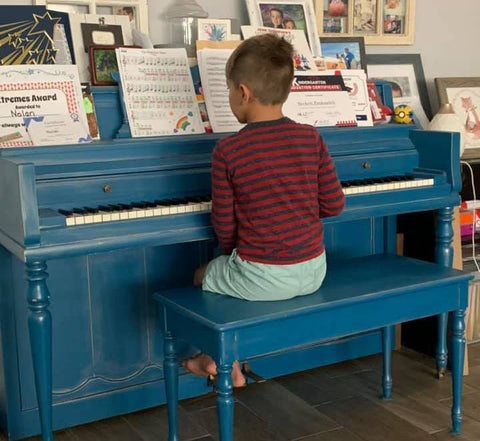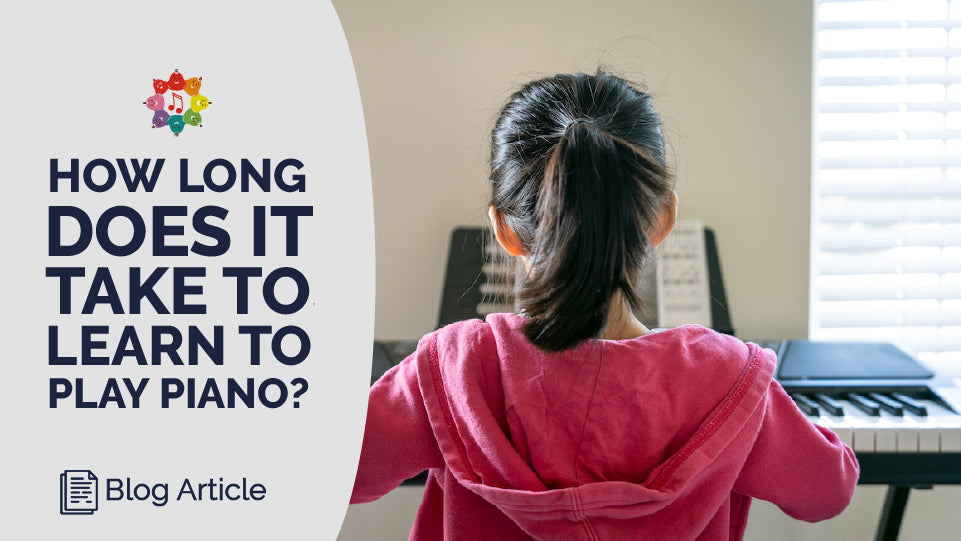When you begin piano lessons for the first time, chances are good that you’re wondering how long it will take before you can consider yourself a piano player.
The reality is that there is no hard-and-fast answer to this question. In fact, many wise music instructors caution that playing the piano is more about the journey than getting to a destination.
After all, you could sit down at a piano right now without ever having had a lesson and play a few notes. As an alternative, you could take lessons for months, practice diligently and be able to play some simple tunes at the end of that period.
Does that mean that you “know” how to play the piano? Sure, it does on some level, but it really depends on what your goals are.
Sitting down at the piano for the first time can be truly intimidating. The 88 keys seem to stare back at you. How will you ever make sense of them?
If you have a great teacher by your side, you can begin to understand the mysteries of the piano fairly quickly. One of the other good things about having an instructor is that they can help you figure out what your goals are. This can be particularly critical for an adult beginner who probably has a very specific reason for taking up the instrument. These goals might include:
- Just for fun
- To enhance their love of music
- To play certain classical pieces
- To be able to play their favorite pop songs
- For greater relaxation
Be upfront about your reasons for taking piano lessons, and your teacher can help you reach your goals.
Accordingly, you might be comfortable saying that you know how to play the piano when you start to really relax and enjoy your playing or when you feel like you’re achieving your goal on a regular basis.
Are you looking for a less subjective measure? If so, then keep reading. We’ll offer some thoughts on what your level of proficiency says about whether or not you know how to play the piano.
How Much Practice Time Are You Putting In?

The average professional pianist may spend anywhere from four to seven hours practicing every day. For the beginning piano student, this can seem like an overwhelming amount of playing. It might even seem like overkill. After all, haven’t professional pianists been playing for years?
Most of them have probably been playing the piano since they were small children. Nonetheless, the quest to perfect their technique never ends. They are always trying to polish their performances, and that requires hours of daily practice and years of dedication.
Fortunately, you are extremely unlikely to ever need to practice for four to seven hours every day. Most amateurs who are just learning the piano will only practice about one to two hours each day. In fact, it is not unusual for many students to practice less than this.
Remember that when learning the piano, like anything else, you get out of it what you put into it. In other words, the more you practice, the more quickly you will make progress, and the sooner you’ll be able to confidently say that you know how to play the piano.
Essentially, if you are putting in several hours of quality practice time each week, faithfully attend your lessons, have a good teacher, and stay dedicated to your efforts, you’ll soon see significant improvement in your abilities.
What’s Your Level of Experience?

It can be enormously helpful to know where you are so that you can make a better plan for where you want to be. Most piano instructors recognize four levels of piano players. These are:
- Beginning
- Intermediate
- Advanced
- Professional
Let’s examine each of these so that you can get a better idea of where you are.
The Beginning Piano Student
If you have never played piano before or have only been attending lessons for a few weeks or months, then you are likely a beginning student.
Perhaps you’re just learning how to read music and making sense of all of the unfamiliar symbols and terminology. Most of your time at the keyboard is spent practicing the basics. Scales and finger exercises may form a large portion of your practice. When you play a piece of music, it’s usually quite short. You may only be introduced to a few measures at a time. Nonetheless, you probably find it challenging.
It’s possible at this stage that you’re only playing with one hand at a time, and that you are relying on a beginner piano book like Adult Piano Adventures All-in-One Piano Course Book 1.
If you are a beginning piano student, your instructor probably is encouraging you to practice between 15 minutes and half an hour each day.

The Intermediate Piano Student
You have likely reached the intermediate level when you have a pretty good grasp of the basics of playing the piano. Your ability to read music has progressed, and you could even attempt a simplified version of a Beethoven sonata, albeit slowly.
If you have reached the intermediate level, then you might be intrigued by the idea of performing in public. Typically, this means a recital with your friends and family in attendance. Your piano teacher may schedule annual recitals for all students, and it’s possible that you’ll spend months in preparation.
In general, a student is considered to have achieved the intermediate level at about three to five years of playing experience. This student has probably completed a variety of beginner-level method books. To get to where they are, they likely practice between one and two hours every day. However, you may practice more or less than this depending on your goals.
If you’re looking for TONS of awesome online piano lessons, definitely check out Hoffman Academy. They have great video lessons and you can learn more about this exact topic on their blog as well at:
https://www.hoffmanacademy.com/blog/how-long-will-it-take-to-learn-the-piano/
The Advanced Piano Student

Most adult learners will not attain this level or will only reach it after many years of concentrated effort. Advanced piano students tend to be individuals who are preparing to go off to college or who are currently studying at a conservatory or at a collegiate level. Accordingly, the advanced student is someone who has devoted countless hours and many years to hone their craft.
At this level, the student can play almost anything that is put in front of them. Anything by Bach, Beethoven, or Mozart is regularly played, and the student may be experimenting with more contemporary works as well.
Students who are advanced may spend a minimum of three to four hours practicing every day. Practicing additional hours is likely, especially if the student is preparing for a performance or an exam.
It is at this point that the pianist really begins working on their artistry and expression as well as getting the notes correct.
The Professional Pianist
Is there ever a level at which the piano student ceases to be a student? Many professionals, even those who have been well-known for years, would say, “no.”
The reality is that there is always more to learn when it comes to the piano. It is possible to polish your technique, refine your artistry and learn new pieces to add to your repertoire.
The professional pianist has chosen to focus their career on the piano. This means that they may spend anywhere from four to eight hours each day perfecting even the tiniest details of their performance.
Learning new pieces still requires serious time and dedication, especially if there is an upcoming recital for which they need to prepare. Some professional pianists also record albums, which also necessitates some serious practice time.
Concert pianists also may spend considerable time collaborating with other musicians or working with the administrative staff of an orchestra.
The Role of the Piano Instructor

From beginners to professionals, most piano players have an instructor on whom they rely for advice and guidance.
While it may be possible to teach yourself the piano what with all of the technology that’s available today, the reality is that only an experienced instructor can ensure that you are using proper technique and provide essential direction for your studies.
Your piano teacher gives you immediate feedback to help you improve your play and can provide you with new challenges along the way. Music instructors also help their students to discover the most efficient and effective practice methods, ensuring that they are making continuous progress.
A good teacher also offers encouragement when it’s needed. Learning the piano is no small feat, and it’s enormously helpful to have a guide to provide support as you learn.
Learn with Prodigies
Are you thinking about enrolling your kids in piano lessons? If so, why not let them test the waters by taking some of the engaging video lessons here at Prodigies? We cover all of the basics of learning music, which can help you to gauge your child’s level of interest and aptitude before signing them up for piano lessons.
Even if your little ones do not become world-famous concert pianists, you will never regret introducing your kids to music at a young age.



